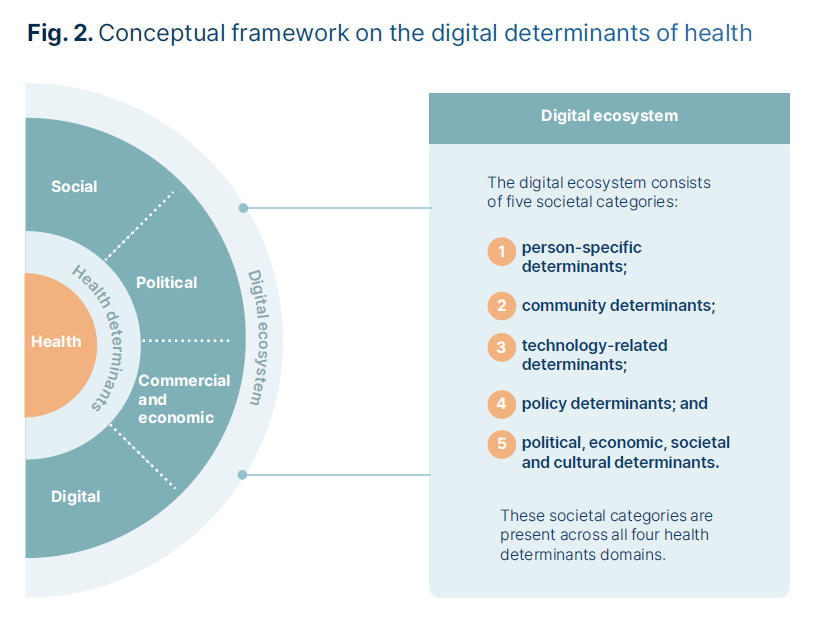Among 127 health determinants, two rank highest: digital divides in the era of tech-enabled health and care: digital divides that shape a person’s political, economic, and social environment, and the person’s health/disability status.

The digital transformation of health and care compel us to re-consider and re-frame social determinants of health in the “digital age,” which is what the World Health Organization in collaboration with the London School of Economics have done in research, published this week in the report, Addressing health determinants in a digital age.
The report was funded by the European Union and brought together the WHO Regional Office for Europe and the LSE. The report had dozens of reviewers residing all over the world (including a few based in the U.S.).
The research identified and reviewed 127 health determinants in the context of the emerging digital determinants of health — in the words of the report, “underscoring the transformative effect of digitalization on health determinants, emphasizing the need for equitable digital access and literacy,” and the importance of data governance and need to address misinformation and harmful online content.

Those granular 127 determinants were further categorized into five domains. For the digital domain, these clustered into,
- Person-specific determinants, covering factors such as digital literacy and availability of devices
- Community determinants, specific to data and digital capacity for the person’s locale
- Technology-related determinants, like data interoperability and algorithmic validation
- Policy determinants, such as data consent and privacy and security policy, and
- Political-economic-societal-and-cultural drivers – think: digital divides, mis/disinformation policy, and data governance.

The researchers conducted a detailed review of the research into the many drivers of health, and then calculated “urgency” scores based on the literature. There were thirty determinants they classified as urgent or very urgent: I culled the Top 10 here in this chart for us to review to reveal some key findings.
Top-line: the most urgent factors point to the need for equitable digital transformation, a “robust” digital public infrastructure, and inclusive health and social care policies, the researchers conclude. Digital factors can shape health, across all its dimensions, in both positive and negative ways.
It behooves all of us who conceive, design, and implement tech-based solutions for health to consider all flavors of impacts — for good and not-so-much — through our research, development, and deployment journeys.

Health Populi’s Hot Points: As a judge for the 2025 CES Innovation Awards, I had the opportunity to review several dozen health-focused tech projects in advance of the annual meeting, culminating in this pioneering group of award honorees.
Having been part of the digital health track and activities at the annual CES for over 15 years, I’m appreciating that developers, the world over, are attending to many of the factors that the WHO/LSE report raises to the level of urgent. From inclusivity to privacy and security, data interoperability and attending to designing to literacy and ease of use, with growing attention to disability and aging assistive technologies, I’m excited to attend CES in a few weeks.
Stay tuned to Health Populi for my on-the-ground perspectives at #CES2025, where I’ll be meeting with the latest innovators as well as participating on panels and podcasts from the Venetian, this year’s epicenter for all-things-digital-health.





 I am so grateful to Tom Lawry for asking me to pen the foreword for his book, Health Care Nation,
I am so grateful to Tom Lawry for asking me to pen the foreword for his book, Health Care Nation,  I love sharing perspectives on what's shaping the future of health care, and appreciate the opportunity to be collaborating once again with Duke Corporate Education and a global client on 6th May. We'll be addressing some key pillars to consider in scenario planning such as growing consumerism in health care, technology (from AI to telehealth), climate change, and trust -- the key enabler for health engagement or dis-engagement and mis-information. I'm grateful to be affiliated with the corporate education provider
I love sharing perspectives on what's shaping the future of health care, and appreciate the opportunity to be collaborating once again with Duke Corporate Education and a global client on 6th May. We'll be addressing some key pillars to consider in scenario planning such as growing consumerism in health care, technology (from AI to telehealth), climate change, and trust -- the key enabler for health engagement or dis-engagement and mis-information. I'm grateful to be affiliated with the corporate education provider  Thank you FeedSpot for
Thank you FeedSpot for